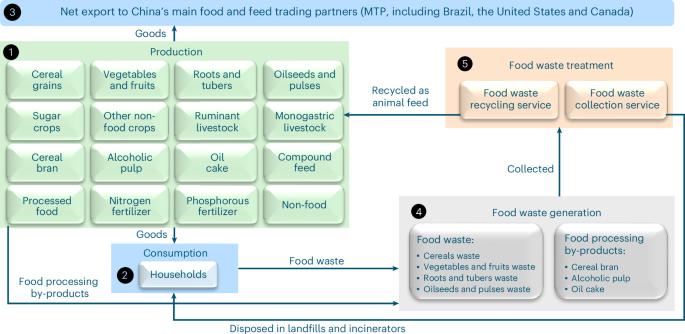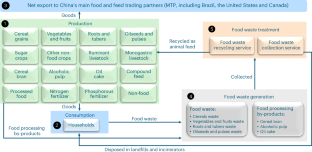Rebound effects may undermine the benefits of upcycling food waste and food processing by-products as animal feed in China
IF 21.9
Q1 FOOD SCIENCE & TECHNOLOGY
引用次数: 0
Abstract
Upcycling food waste and food processing by-products as animal feed could reduce livestock-related emissions, but rebound effects, where lower feed costs lead to livestock expansion, may diminish these benefits. Here, using an integrated environmental–economic model, we assess the impacts of this upcycling in China’s monogastric livestock production. We find that upcycling increases monogastric livestock production by 23–36% and raises total acidification emissions in China by 2.5–4.0%, while domestically total greenhouse gas emissions decrease by 0.5–1.4% through less waste sent to landfill and incinerators and a contraction in non-food production. This upcycling enhances food security and has substantial knock-on effects beyond the agricultural sectors, through influencing sectoral employment, gross domestic product and household welfare. Although emission taxes could absorb the rebound effects on emissions, they may also negatively impact food security and shift emissions abroad, depending on tax levels. A scenario analysis and integrated environmental–economic model demonstrate that repurposing food waste and food processing by-products for animal feed has asymmetric effects on food security and environment sustainability.


反弹效应可能会削弱中国将食物垃圾和食品加工副产品作为动物饲料进行升级回收的好处
将食物垃圾和食品加工副产品升级为动物饲料可以减少与牲畜有关的排放,但反弹效应,即饲料成本降低导致牲畜扩张,可能会削弱这些效益。本文采用综合环境经济模型,评估了这种升级循环对中国单畜牧生产的影响。研究发现,升级回收使中国单胃牲畜产量提高了23-36%,酸化总排放量提高了2.5-4.0%,而通过减少填埋和焚化的废物以及减少非食品生产,国内温室气体总排放量减少了0.5-1.4%。这种升级利用增强了粮食安全,并通过影响部门就业、国内生产总值和家庭福利,在农业部门之外产生了巨大的连锁效应。虽然排放税可以吸收对排放的反弹效应,但也可能对粮食安全产生负面影响,并将排放转移到国外,具体取决于税收水平。
本文章由计算机程序翻译,如有差异,请以英文原文为准。
求助全文
约1分钟内获得全文
求助全文

 求助内容:
求助内容: 应助结果提醒方式:
应助结果提醒方式:


